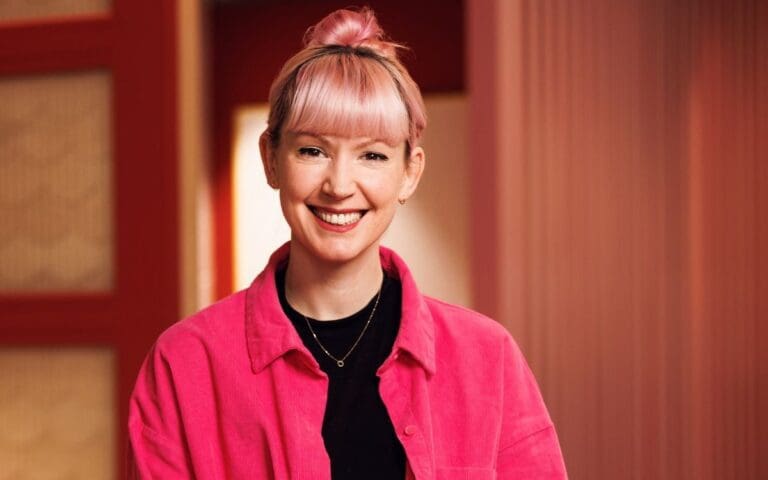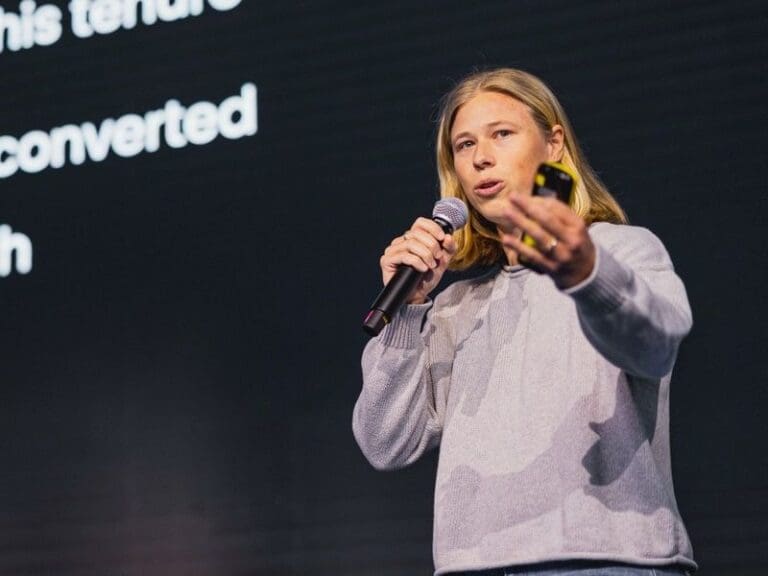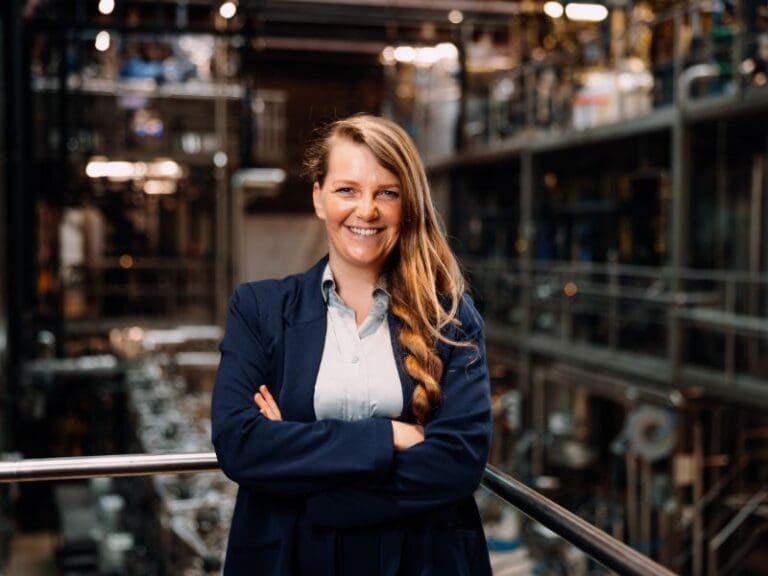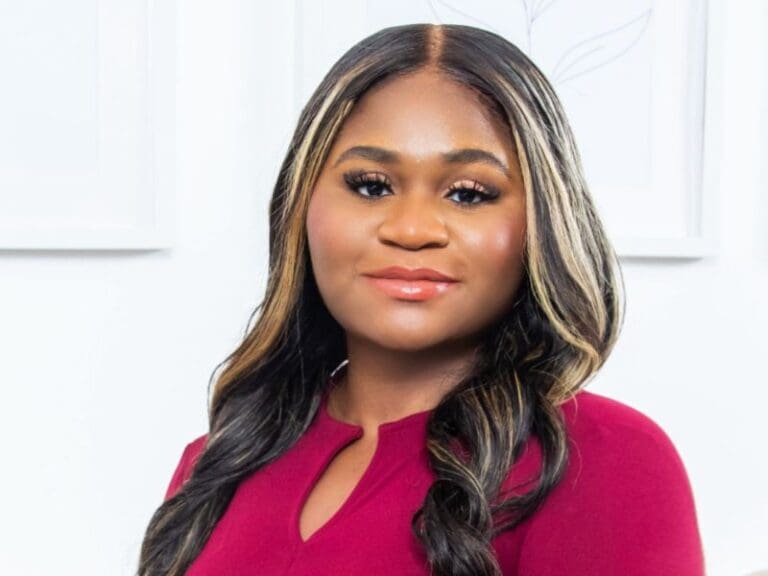With a background in content design and content strategy, she champions accessible, inclusive design and collaboration across disciplines to ensure that Opencast delivers exceptional user-centred experiences.
SHECANCODE SAT DOWN WITH EMILY TO TALK ABOUT HOW SHE GOT INTO TECH AND LANDED HER CURRENT ROLE, HER ROLE MODELS AND HER CAREER ADVICE FOR OTHER WOMEN IN TECH.
HOW DID YOU LAND YOUR CURRENT ROLE? WAS IT PLANNED?
I’ve always been open to trying and testing things out, before I settle down, so for this reason I’ve never fully planned out my career. At university, I studied Japanese, so quite far off from what I do now!
After graduating I moved to the Netherlands, where I taught English and did copy-editing. I considered a career in academia but wasn’t convinced by the lack of stability. When I moved back to the UK, I ended up working in digital a little by accident – I needed a job and ended up at a small digital product company. From that I found that my years of seemingly quite random experience coalesced really well into a job called “content design”. It was quite a revelation that this kind of role existed, and as I got more experience, I started to see a career path for the first time.
It was quite stressful for many years having no set career path and battling with the uncertainty of where my career would end up. On the flip side, that inspired me to give a lot of things a go – and find UCD as a result.
The opportunity to join Opencast came when I was working at an agency as part of a wider User- centred design team. At that time Opencast was planning its first user centred design department, and that really excited me, so I decided to take a chance, becoming a consultant. I was working in that role for about a year, when my boss at the time left, so her position of leading the user centred design department was open for applications.
At first, I didn’t consider applying as a leadership role had not been on my horizon, but I thought about it some more and people encouraged me to try, believing I’d be a great fit. So I thought, why not! I reasoned that even if I don’t get the position, I’ll receive valuable feedback that I can use in my career. But it happened! I have been the Head of User Centred Design at Opencast for more than a year and a half now and I absolutely love it.
WHAT ARE THE KEY ROLES IN YOUR FIELD OF WORK, AND WHY DID YOU CHOOSE YOUR CURRENT EXPERTISE?
In terms of roles in the industry, the UCD/ UX field is currently thriving and is very diverse in terms of the roles you can go for. The good thing about an emerging industry is that the roles and work are still being defined – which really allows you to shape the sector. In our UCD team at Opencast we have 4 key roles: Content Design, Interaction Design, User Research and Service Design. My area of specialism is content design, also known as UX writing. It’s a fairly recently established role, so people tend to have quite squiggly backgrounds. There’s no degree you can do in Content Design, for example. I always considered myself a creative person, but I didn’t do a design degree, so I had discounted a career in design. But I found that content design was a perfect fit for me because it combined creativity with my love for words and a determination to make things better for people.
DID YOU (OR DO YOU) HAVE A ROLE MODEL IN TECH OR BUSINESS IN GENERAL?
In the past, I’ve been really lucky that almost all of my managers have been women in a predominantly male sector.
I got the opportunity to work with these amazing women directly who helped me develop my career further, offering advice and leading by example.
Outside of my immediate corporate circle, I look up to people like Sarah Winters – former Head of Content at GDS – who essentially wrote the book on content design, titled “Content design”. It’s my go-to and it does a really good job of breaking down working with words in a digital setting, which is essentially everybody’s job. After all, most people write emails!
So, it was incredible women like Sarah and all my previous managers that each made me think a little bit differently about my role in UCD. Not only about being a better professional but also having an overarching strategic impact with my skill set.
WHAT ARE YOU MOST PROUD OF IN YOUR CAREER, SO FAR?
The highlight of my career so far has definitely been building the Opencast’s UCD team from 19 to 70 people in only a year. It’s an incredible team of professionals who support each other, and always go above and beyond. It’s such a refreshing working environment to be in and it motivates me to keep going and improve every day.
WHAT DOES AN AVERAGE WORK DAY LOOK LIKE FOR YOU?
No two days are the same in user centred design, but I do try to be quite strict with my calendar. In general, my day is split between focusing on client and business tasks, and then my responsibilities as a leader supporting the people I work with. It’s also important to me that I have time to think and reflect, so I have this habit of blocking out some time each day just for deep thinking.
The other part of my role is providing support to my team. I have a team of 4 Practice Leads who are responsible for the development of each UCD discipline. We work together each week to set priorities that will drive each practice forwards and improve things for our consultants, clients and ultimately their end-users.
I’m also involved in talent excellence initiatives, from identifying what training people will benefit from to creating new pathways to bring people into UCD from non-tech backgrounds. We recently ran progression panels for employees for promotion and career advancement – it’s important to me to encourage our people to be the best they can be.
ARE THERE ANY SPECIFIC SKILLS OR TRAITS THAT YOU NOTICE COMPANIES LOOK FOR WHEN YOU’RE SEARCHING FOR ROLES IN YOUR FIELD?
The two I look for more than anything else are communication and teamwork. Communication skills are critical to tech careers, because building relationships is a huge part of the job, despite the popular misconception that people in the industry just sit behind the computer screen.
Yet, you rarely see those skills prioritised on most job ads.
Teamwork is hugely important. Being able to contribute in a team setting and collaborate effectively can make or break a project. This looks different for each person – we don’t need everyone to be gregarious extroverts! It’s more important that people can work with different kinds of individuals, can compromise and negotiate, and support each other.
Another useful skill for a consultant is the ability to step back and see the big picture, but at the same time to zoom into the detail when you need to. That’s a skill that you need to use constantly throughout the day, and one that usually comes with practice over time.
HAS ANYONE EVER TRIED TO STOP YOU FROM LEARNING AND DEVELOPING IN YOUR PROFESSIONAL LIFE, OR HAVE YOU FOUND THE TECH SECTOR SUPPORTIVE?
There are many barriers for women in tech that are multilayered, so I would say while there hasn’t been a set person that has stopped my development, the male dominated culture of the industry has presented some roadblocks to development.
That is why it’s important companies get as many young women excited about technology as possible and cultivate mentorships for them to support each other.
Then, there’s the popular misconception that you have to have a technical background to thrive. Specifically to the UX industry, there can be this view that it isn’t a ‘serious’ part of tech. Some can be quite dismissive of the work we do even though it is pivotal for technology. It’s an ongoing struggle to constantly prove ourselves.
HAVE YOU EVER FACED INSECURITIES AND ANXIETIES DURING YOUR CAREER, AND HOW DID YOU OVERCOME THEM?
When I entered the tech industry, I felt quite peripheral and thought I had simply got lucky to have snatched onto the edge of something here. It’s very common for women to feel this way in tech, rather than an asset to the company they are working for.
Fortunately, meeting up with women across the tech sector has helped me massively. By hearing other women’s stories in the industry I have slowly realised I was not alone and that there’s always support available for me and for women in similar positions.
ENTERING THE WORLD OF WORK CAN BE DAUNTING. DO YOU HAVE ANY WORDS OF ADVICE FOR ANYONE FEELING OVERWHELMED?
It is always overwhelming to put yourself out there, to fight this culturally accepted idea of perfectionism and combat imposter syndrome, especially if you are a woman. You constantly feel self-conscious about yourself, not willing to take risks out of fear that your colleagues will think less of you. So in terms of advice, I would say don’t be afraid to take risks, but try to reframe them as an opportunity to test and learn. You will face setbacks and disappointments (we all do!), so giving yourself the space to reflect on what happened and identify things to change – and then test your changes next time – might help turn the challenge into more approachable mini-challenges.
WHAT ADVICE WOULD YOU GIVE OTHER WOMEN WANTING TO REACH THEIR CAREER GOALS IN TECHNOLOGY?
I’d let women know that there are many career paths for them in the tech sector. I would encourage them to be curious and explore their options, because they have valuable skills and knowledge that the industry very much needs right now. Connect with other women as well, whether that’s through mentorship programmes or meetups, listen to their advice and share your experiences. The more you put yourself out there, the more you will learn about the sector and its many opportunities, including more exciting job positions available that fit your interests and your career aspirations.
Equally, finding a nurturing working environment that prioritises its employees growth, and promotes a culture of openness is critical.
It gives you the confidence to try out new things, ask all the questions, supports your learning and ultimately helps you achieve your career aspirations.







